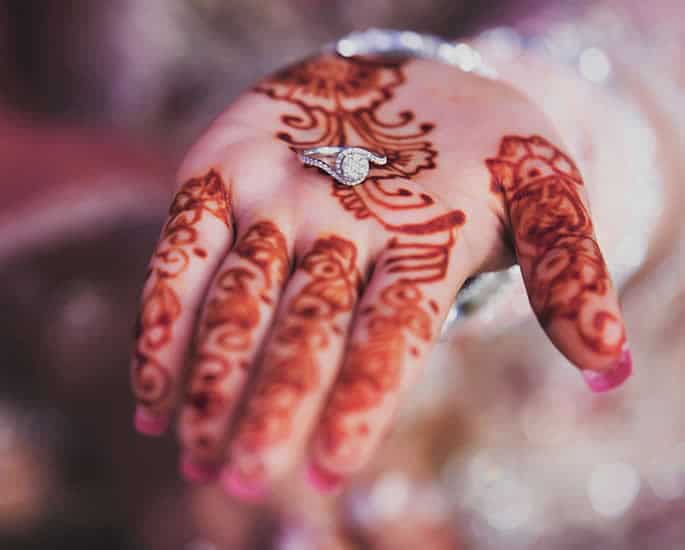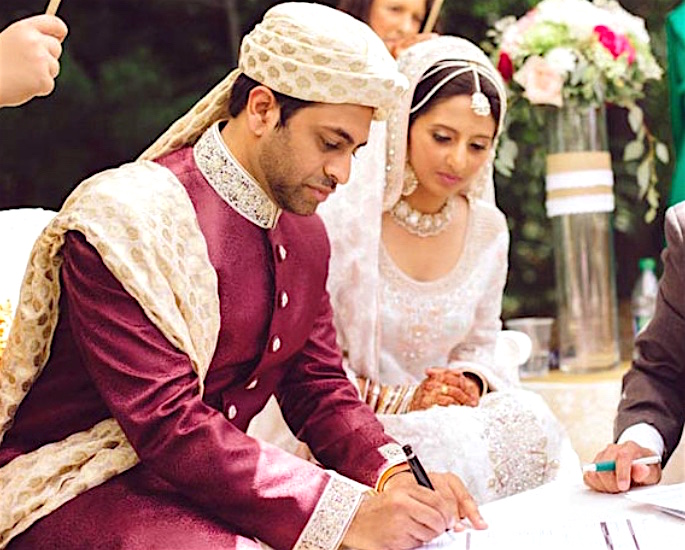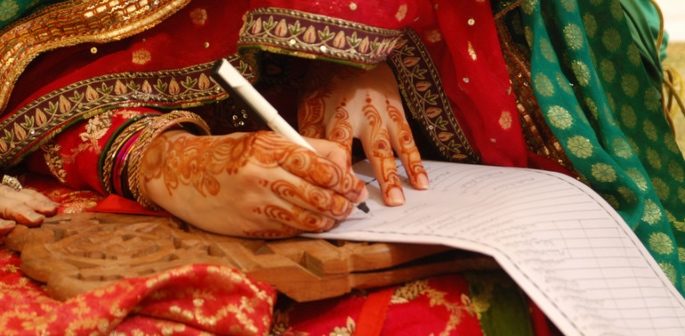"I still do not know what the nikkah contract entails."
While marriage is highly prioritised, it is shocking to find that many Pakistani brides are unaware of the clauses of the nikkah contract, which establishes their rights.
Take a moment to consider this – would you ever sign a business or employment contract without having read the clauses thoroughly?
The answer is most likely no. You will most likely read it several times before even considering signing on the dotted line.
Then why are Pakistani brides arguably signing their lives greatest contract without being in the know-how?
Instead of explaining the rights applicable in a nikkah contract, women are taught how to be an ideal wife and daughter-in-law.
Stereotypically, this includes cooking, cleaning, selfless sacrifice and many more cultural norms.
But what about the abiding laws when a man and women enter a nikkah contract?
Also known as the nikkah nama, prospective brides are ignorant of its clauses and significance.
However, why are women so vulnerable to blindly signing the nikkah nama?
We explore why Pakistani bride’s rights are crucial in a nikkah contract.
What is a Nikkah Contract?

The nikkah contract is an obligatory document, which must be signed by two Muslim partners.
This binds them into a matrimonial union once the respective partners have signed the nikkah contract.
The nikkah nama is then kept as legal evidence of the marriage under the Muslim Family Laws Ordinance 1961.
However, this integral part of the marriage involves more than just a simple signature. It includes the rights, duties, obligations and legal requirements.
Despite this, many Pakistani brides are unaware of the rights and obligations laid out in the nikkah nama.
DESIblitz exclusively spoke to Sana about whether she was aware of her rights in a nikkah nama. She said:
“When I got married almost 16 years ago, I did not have a clue about the ins and outs of a nikkah contract.
“To be quite frank, I still do not know what the nikkah contract entails.
“Thankfully I have had a blissful marriage. However, I will ensure that my daughters are aware of their rights.”
The formal document must also be signed by two witnesses who act as a validation of the marriage.
In the event of a divorce, the nikkah contract including its clauses will be interpreted in the court of law.
Clauses

The nikkah nama is more than just saying kabool hai (I do) and then proceeding to sign on the dotted lines.
It involves several clauses which are often overlooked by the bride because they are not told about their legal rights in a marriage.
Clauses 1-6
These sections of the nikkah contract are arguably the simplest and relatively most straightforward part of the nikkah nama.
It includes the basic details like the names of both parties, age, address, where the nikkah was held and so on.
In particular, section 6 requires the bride’s age. This is extremely important for brides in Pakistan where child marriages are prevalent.
In fact, according to the Child Marriage Restraint Act 1929, the legal age for both the bride and groom must be 18 years.
Clauses 7-12
These sections are primarily dedicated to including information about both the witnesses.
Traditionally, it is preferred to have a witness from both the bride and groom’s side.
Clauses 13-16
Famously known as a mehr, these sections of the nikkah nama is the one many people are made aware of.
Clauses 13-16 outline information about the mehr, which is known as an obligatory gift.
It is given to the bride from the groom as an effect of marriage. It can be handed over as a sum of money or other profitable goods including property.
There are two types of mehr to consider: prompt and deferred. The former becomes payable immediately after both parties enter the marriage.
While the latter is payable on account of death, divorce or when the wife demands.
The difference between prompt and deferred mehr is necessary. It is important to note that the right to claim mehr is absolutely essential and must not be left unfulfilled.
This section of the nikkah contract ensures the monetary rights of a wife.
Clause 17
This section is considered the second most important clause in the entire nikkah contract.
It allows the wife and groom to put down any conditions they wish in order to aim for a successful marriage.
In particular, the bride can make good use of this section to ensure her rights are maintained even after marriage.
Terms like being allowed to work after marriage, childbearing and more can be issued in this clause.
Like any other Islamic contract, the conditions put forth must abide by Sharia Law.
While this clause has existed since its earliest days, many Pakistani brides are unaware of this important optional condition.

Clauses 18-19
These clauses are the most significant sections in the entire nikkah nama as it relates to the element of talaq (divorce).
Even though the thought of divorce is not favoured, it is important to consider the possibility as the future is uncertain.
Understandably, these clauses are essentially dismissed by elders in the family as divorce is not favoured.
It is commonly known that a man is permitted to terminate the marriage while a woman must appeal for dissolving her marriage if she sees fit.
However, what many brides do not know is that clauses 18-19 tend towards the woman’s right to delegate divorce.
It is imperative the bride ensures she is given this right in the contract.
This is because it will allow the woman to terminate the marriage without unnecessary delay.
In instances where the wife is suffering from abuse at the hands of her husband, this clause will come in use.
If this right is not exercised then a woman seeking a divorce will have to go through khula.
As a result of this, she will have to give up her mehr and alimony. The wife is also expected to go through a three-month reconciliation process.
If this attempt fails, the wife is then granted a divorce.
However, a delegated divorce can avoid this process for a woman who wishes to leave her marriage.
She will also go through the same process as a man without having to compromise on her mehr.
Clauses 20-21
Section 20 of the nikkah nama establishes the groom’s financial status to omit any discrepancies both parties may have.
Meanwhile, clause 21 verifies the groom’s marital status. In this instance, it helps to avoid a polygamous relationship.
In instances where the groom is already married, it ensures he has gained his first wife’s permission for the second marriage.
If he has not then the first wife can use noncompliance against her husband.
Clauses 22-25
This is another easy requirement in the nikkah contract and the most obvious.
These sections involve the signatures of the respective bride and groom as well as their witnesses’ signatures.
Before signing the contract, it is vital the bride carefully reads through the nikkah nama.
While there is no right or wrong for these clauses, the woman must raise any questions she feel necessary at this point.
Ignorance

However, it appears it is not only women who are unaware of the clauses in a nikkah contract, men are also ignorant in the matter.
Malik from Small Heath, Birmingham exclusively spoke to DESIblitz. He said:
“When I got married even I was not made aware of the clauses in a nikkah contract.
“All I knew was that a husband requires his wife’s permission if he was ever to get married a second time.
“Apart from that, I had no knowledge about the other clauses.
“I think nowadays the maulvis should make the couple aware of the rights and obligations in the contract.
“This is because it is good to know what you are getting into. Especially for females, they should know what rights they are entitled to.”
Nadia, a 24-year-old teacher is a prospective bride. Unlike Sana, she is aware of the clauses and rights outlined in a nikkah contract. She said:
“I am currently a bride-to-be and the ins and outs of the nikkah process were not something that has been ever explained to me by my family.
“All we ever knew was that you were required to recite certain verses and agree or disagree with the marriage in question.
“Away from this, I took it upon myself to look into the logistics of the different clauses.”
“This made me much more aware of my rights and that there was a lot of information that is usually overlooked in nikkah processes.
“This has made me reconsider my rights and that I do have an opportunity to ever add certain clauses into my contract if need be.
“Also, how important it is for brides to be to look into and realise that there is more to their nikkah than perhaps what they are told.”
We urge prospective brides and even grooms to thoroughly read through the clauses in a nikkah contract.
It is crucial to fill out each of the clauses. If any conditions are later violated then the spouse can be held responsible.
Brides must ensure they are aware of the importance of understanding their marital rights.
While the clauses are in place, it is the role of women and their future husbands to educate themselves in this matter.






























































